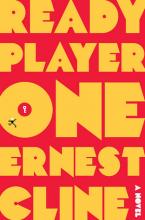Ernest Cline: Ready Player One

In Ready Player One, global warming, an energy crisis, war, famine, and poverty have made the world a bad place, so many people use a high fidelity virtual reality game, the OASIS, as their escape. The protagonist uses his knowledge of 80s video games, movies, and music to try to win a contest that would net him billions of dollars.
The book is generally good, and it could have been great, but it wasn't great. As such, even though I generally liked the book, most of this post is fairly negative. Here is the negativity:
- I don't think that the energy crisis is realistic. The book makes it seem like shortages in fossil fuels would create an energy crisis. That isn't believable for electricity because the US have 500 years worth of coal available at similar prices to what we have now, so we probably wouldn't have a shortage by 2044. Also, the discussions of peak oil mean that we'll run out of cheap oil, not that we'll run out of oil.
- The OASIS requires a fancy virtual reality setup (think Oculus Rift, but better and cheaper), but it's not clear why. It seems like the author wanted to capitalize on images of nerdy people in virtual reality suits and escapism, but the OASIS doesn't seem to be much different from an online multiplayer video game of today. The book tries to make it seem like the virtual reality setup is qualitatively different than using a traditional computer, but it never shows how.
- The economy of the OASIS is significant to the plot, but it doesn't make any sense. In the book, the OASIS economy is more stable than most real world economies, and there is an exchange between OASIS currency and real currency. However, the OASIS also acts like a traditional MMORPG (you can kill monsters and complete quests to level up and get money, and higher level characters can kill higher level monsters to get more money) and integrates with today's MMORPGs like Everquest and WoW. Not only would that require a horribly complex meta-economy (since it has multiple worlds each with their existing economies), but that type of economy also has huge problems with inflation.
- The progression in the OASIS is also hard to believe. The game is hard to get started with because it takes a significant investment to fight low level monsters, which would be atrocious game design. Also, people who have been playing for years are only mid level, but after playing for a couple months, they can get to the max level. But for some reason, even though a couple months of play can get you to max level (which would make it easy for you to get plenty of in game, and thus real world, currency, devaluing the currency), it doesn't seem like everyone is max level.
- The technology and programming talk was wrong. For instance, the book indicates that "a gifted human player could always triumph over the game's AI, because software couldn't improvise. It could either react randomly, or in a limited number of predetermined ways." No. In some situations, software can figure out the perfect move to make and make that precise move with no margin of error. In other situations, software can take its best guess and effectively improvise using many of the same strategies that humans use to improvise. When Google is giving you search results, is it providing random results or a limited number of predetermined results, or is it improvising?
- The discussion of escapism and people's motivations for using the OASIS doesn't seem very nuanced. It mostly plays out as "the world sucks. I'm an antisocial nerd. Therefore, I spend all of my time in the OASIS, but I'm still lonely because this isn't real." One character sums up the OASIS as "a self-imposed prison for humanity... A pleasant place for teh world to hide from its problems while human civilization slowly collapses, primarily due to neglect." As a result, even though the book pays some lipservice to the idea that people can do meaningful things online, including learning and forming human connections, the book seems to undermine those notions.
- Despite having the perfect opportunity, the book barely explores the notion of identity as a social construct. Yes, it brings up that online no one knows whether you're a dog or a cat and that "Everything about our online personas is filtered," but it doesn't ask the follow up question: how are our offline personas any different? Or even: how does a person's external persona affect their individual self-perception and identity?
- There is a tendency for people to think of themselves as the exception rather than the rule, and this book glorifies that. The premise of this book is that spending your time immersed in pop culture and video games might pay off in a significant way. I don't think it's healthy to give so much attention to celebrities and athletes such that kids aspire to those things and spend a ton of time doing those things. We need more books like the Martian and movies like Big Hero 6 where the protagonist is special because they're good at engineering. We need more games like Beyond Good and Evil where the protagonist achieves change through journalism. We need more books like the Demon Cycle where the protagonists make the world better through science and social movements.
In short, my criticism is that the book created a lot of openings for doing interesting things, but then it goes forward with a cliche rather than following through with meaningful and interesting questions.
Despite all that, the book was generally well written and an enjoyable read.



